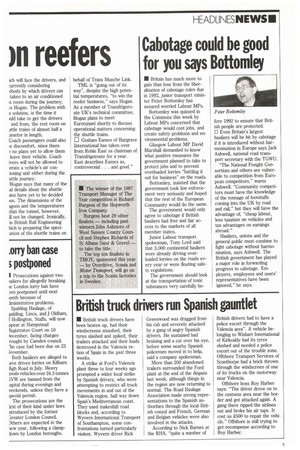• Britain has much more to gain than lose from
Page 7

If you've noticed an error in this article please click here to report it so we can fix it.
the liberalisation of cabotage rules due in 1992, junior transport minister Peter Bottomley has assured worried Labour MPs.
Bottomley was quizzed in the Commons this week by Labour MPs concerned that cabotage would cost jobs, and create safety problems and environmental problems.
Glasgow Labour MP David Marshall demanded to know what positive measures the government planned to take to protect jobs and to prevent overloaded lorries "battling it out for business" on the roads.
Bottomley, insisted that the government took law enforcement very seriously and hoped that the rest of the European Community would do the same.
The government would only agree to cabotage if British hauliers had free and fair access to the markets of all member states.
Junior Labour transport spokesman, Tony Lord said that 3,000 continental hauliers were already driving overloaded lorries on the roads every year or were flouting safety regulations.
The government should look at the transportation of toxic substances very carefully be fore 1992 to ensure that British people are protected. El Even Britain's largest hauliers will be hit by cabotage if it is introduced without harmonisation in Europe says Jack Ashwell, national road transport secretary with the TGWU.
"The National Freight Consortium and others are vulnerable to competition from European competitors," warns Ashwell. "Community competitors must have the knowledge of the tonnage of footstuffs coming into the UK by road and rail," but they will have the advantage of, "cheap labour, less taxation on vehicles and tax advantages on earnings abroad."
Hauliers, unions and the general public must combine to fight cabotage without harmonisation, says Ashwell. The British government has played a major role in forwarding progress to cabotage. Employers, employees and users' representatives have been ignored," he says.




































































































































